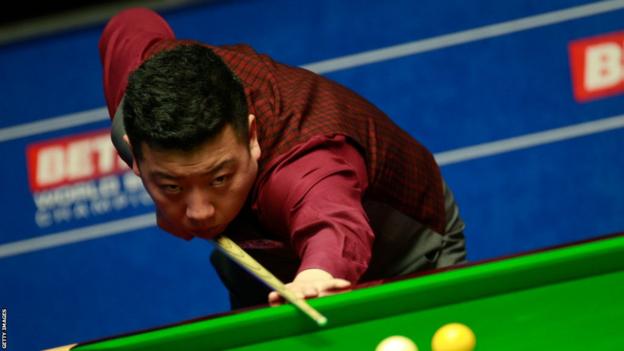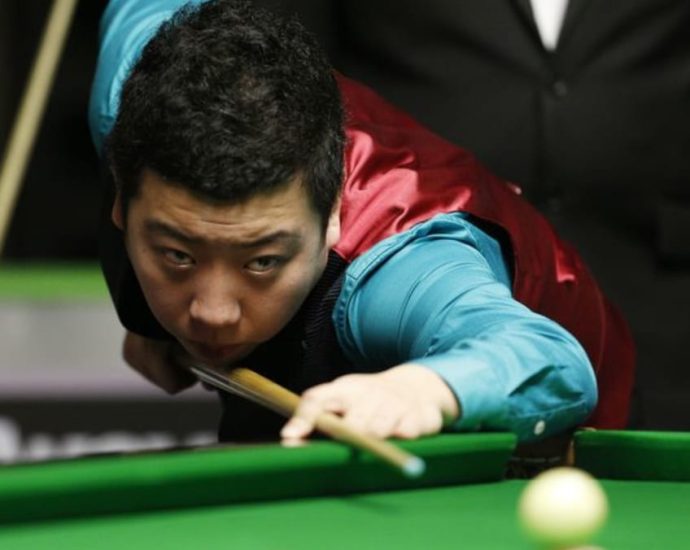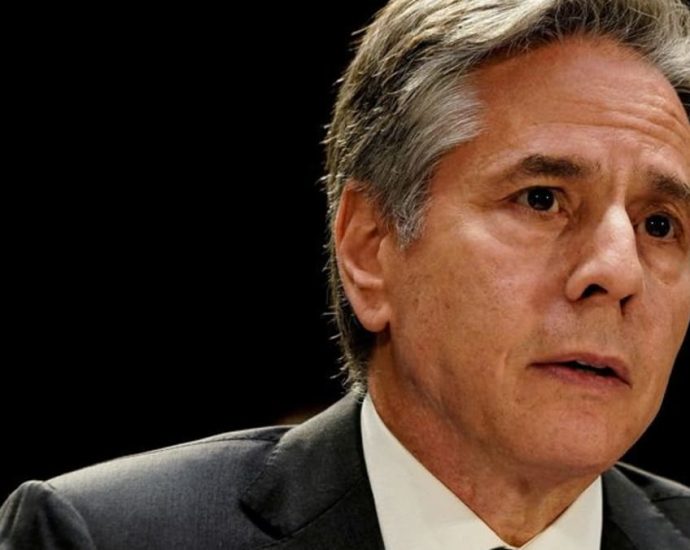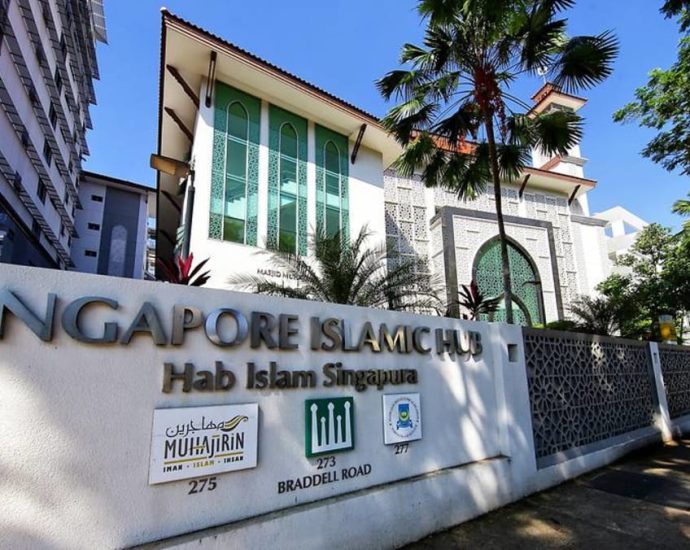Liang and Li handed lifetime bans for match-fixing

Chinese players Liang Wenbo and Li Hang have been handed lifetime bans for their involvement in snooker’s biggest match-fixing scandal.
Eight other players, all from China, have received bans ranging from 20 months to five years and four months from the World Professional Billiards and Snooker Association (WPBSA).
The allegations include manipulating games, approaching players to cheat, betting on snooker and fixing matches.
Yan Bingtao, the 2021 Masters champion, has been banned until December 2027, while former UK Championship winner Zhao Xintong must serve a suspension that ends in September 2024.
All 10 players have until 20 June to appeal against the decisions.
WPBSA chairman Jason Ferguson said: “This has been a very complex case. It has been heart-breaking to see some young talented players fall foul of the WPBSA Conduct Regulations through pressure exerted by two senior players.
“This behaviour has been recognised as wholly unacceptable by the imposition of two lifetime bans from participating in recognised snooker in any way.
“I am pleased that the commission found that they did not see from the present case any evidence of a wider culture of wrongdoing in snooker.
“The WPBSA will continue its strong stance against those who try to manipulate sport and today’s outcome sends out a clear message that match-fixing will not be tolerated in snooker.”

Punishments will act as ‘strong deterrent’ – analysis
Jamie Broughton, BBC 5 Live snooker reporter
The WPBSA has worked hard to investigate this complex case and will be delighted by the punishments handed out.
Over the past decade, the organisation has shown its determination to investigate allegations of corruption, and charge anyone it believes to be guilty of wrongdoing.
Snooker’s had to endure some negative headlines over recent months, but the lifetime bans handed out to Liang Wenbo and Li Hang should act as a strong deterrent to any players tempted to get involved in match-fixing.
For many snooker fans, the real sadness in this case is why two of China’s biggest stars, Yan Bingtao and Zhao Xintong, got involved. Both players have been talked about as world champions in the making.
And questions will now be asked if more can be done by the snooker authorities around the world to educate young players about the dangers of corruption.

What were the verdicts and punishments?

Liang Wenbo
Age: 36 Ranking: 72. Finalist in 2015 UK Championship
Given a lifetime ban and ordered to pay £43,000 in costs. He was found guilty of fixing or being a party to fixing five matches, trying to get other players to fix nine matches, betting on snooker matches, threatening another player, deleting messages and asking other players to, failing to cooperate with the enquiry.
Li Hang
Age: 32 Ranking: 71
Given a lifetime ban and ordered to pay £43,000 in costs. He was found guilty of fixing or being a party to fixing five matches, trying to get other players to fix seven matches, betting on snooker matches, deleting messages and asking other players to.
Lu Ning
Age: 29 Ranking: 65. Semi-finalist at the 2020 UK Championship
Given a ban of five years and four months, reduced from eight years after his early admissions and guilty plea. He has to pay £7,500 in costs. He was not found guilty of inducing others to fix matches. He accepted charges of fixing four snooker matches he played in, betting on matches and deleting messages.
Yan Bingtao
Age: 22 Ranking: 23. First player born in 2000 to turn professional, won 2021 Masters
Given a ban of five years, reduced from seven and a half years after his early admissions and guilty plea. He has to pay £7,500 in costs. He accepted charges of fixing four snooker matches he played in and betting on matches.
Zhao Xintong
Age: 25 Ranking: 11. Won 2021 UK Championship and 2022 German Masters
Given a ban of one year and eight months, reduced from two and a half years after his early admissions and guilty plea. He has to pay £7,500 in costs. He accepted charges of being a party to another player fixing two matches and betting on matches himself.
Zhang Jiankang
Age: 24. Ranking: 93
Given a ban of two years and 11 months, reduced from four years and five months after his early admissions and guilty plea. He has to pay £7,500 in costs. He accepted charges of fixing a snooker match he played in, betting on matches and not giving the WPBSA information.
Chen Zifan
Age: 27. Ranking: 104
Given a ban of five years, reduced from seven and a half years after his early admissions and guilty plea. He has to pay £7,500 in costs. He accepted charges of fixing or contrived, or being a party to an effort to fix or contrive the result or score of three snooker matches that he played in.
Chang Bingyu
Age: 20 Ranking: 88
Given a ban of two years, reduced from three years after his early admissions and guilty plea. He has to pay £7,500 in costs. He accepted charges of fixing a snooker match he played in.
Zhao Jianbo
Age: 19 Ranking: Amateur
Given a ban of two years and eight months, reduced from three and a half years after his early admissions and guilty plea. He has to pay £7,500 in costs. He accepted charges of fixing a snooker match he played in – and betting on that match.
Bai Langning
Age: 20. Ranking: 130
Given a ban of two years and four months, reduced from four years after his early admissions and guilty plea. He has to pay £7,500 in costs. He accepted charges of fixing a snooker match he played in.
Maybe the Ukrainians blew up the Kakhovka Dam?
For the Russians to have blown up the Kakhovka dam they would have needed to move tons of explosives using boats or underwater equipment, put explosives on the dam facing the reservoir and set off a massive explosion. From the video posted by the Ukrainian government, it looks like the explosions happened below the waterline.

The Kakhovka Dam is a hydroelectric power station. When operating it provided 357 mw of power and cooling water for the 5.7 gigawatt Zaporizhzhia nuclear power plant. It also supplied water for agriculture in southern Ukraine and northern Crimea.
When the Crimean Kerch Strait bridge was blown, there was a truck that blew up on the bridge and an attempt to blow the supporting pillars of the bridge using an underwater vehicle. The main bridge pillar did not fall, meaning the explosive power from the underwater explosion was not sufficient to do the job. The bridge was not bombed by aircraft, glide bombs or missiles.
There are few if any weapons that could break the dam. Moreover, it is unlikely that a large bomb could cause the sort of damage we are seeing on video.
It should be noted that in May and June the Ukrainians were firing missiles and artillery shells at the dam. It is claimed these attacks caused some cracks in the dam.
Zelensky may have sort of given away the game about the dam when he said it was an inside job. He meant by the Russians – and indeed there is a precedent: Stalin’s forces bombed what was then the world’s third largest dam on the same river in 1941 to try to slow the German advance through Ukraine.

But it’s hard to see what the Russians might have expected to gain this time. And it’s remarkable that one of the earliest pieces of news to emerge from the Kakhovka Dam blast is that the Ukrainians sent dozens of boats to pick up personnel from islands, downstream from the dam, that were being flooded out.
Organizing such a rescue so quickly suggests these relief assets were prepared and ready for action – and indeed the Ukrainians say they had prepared for just such an eventuality.
The Russians say they did not blast the dam and had no reason to do so.
They know that striking the dam could cause severe problems for the Zaporizhzhia nuclear power station, which needs great amounts of cooling water. This power plant is the largest one in Europe and is under Russian control. It still isn’t clear whether the power plant is any longer safe.
The dam break also threatened Russians’ defensive works in the areas that they hold near the river below the dam, territory that Ukraine has been trying to take back.
The Russian news source Sputnik Global has put out a long article in the form of a “fact check” saying that the dam was hit by the Ukrainians.
No doubt the Russians felt compelled to push back as the Western press swallowed Zelensky’s claim that Russia did it, headlining the claim on virtually all wire services and major newspapers. Following the initial trove of articles blaming Russia, papers like the New York Post are saying Putin is trying to destroy the Zaporizhzhia nuclear plant:
‘Lunatic’ ‘Terrorist’ Putin is turning plant into improvised nuke, ex-military official warns
New york post
It is hard to see how the dam explosion benefits Russia.
It is true that Ukrainian military folks on the small islands in the river had to leave, but when the water subsides they will come back.
The only seemingly unexpected result is that it was the top section of the dam that was destroyed. The lower portion is still in place meaning that not all the water in the reservoir behind the dam will escape and cause more inundation. It is possible this was planned to work that way, but setting off tons of explosives is not a good way to test such an engineering hypothesis.

There may yet be enough water to take care of the nuclear plant on the one hand, and most of the Russian fortifications probably survived. The Russians have not said otherwise.
It will take time to get a full accounting if we ever get one. We still don’t have one for the Nord Stream pipeline or for Crimea’s Kerch Strait Bridge.
If the idea behind this was to cause a major nuclear accident that could be blamed on the Russians, it is an outrageous act that threatens Ukraine and Europe, maybe the world.
If it was Ukraine that did it, did they act on their own or did they get permission from outside? If it was Russia, then someone had better come up with arguments supporting that proposition.
Stephen Bryen is a senior fellow at the Center for Security Policy and the Yorktown Institute. This article was originally published on his Substack, Weapons and Strategy. Asia Times is republishing it with permission.
Prosecutors under fire over bribery case

An activist is pressing prosecutors for answers as to why they decided not to indict senior police officers charged with accepting a bribe from an entertainment venue in Kanchanaburi in 2015.
Ronnarit Prueksayachiwa, chairman of a foundation set up to assist victims of violence against women and children and human trafficking, has forwarded a petition to Kosolwat Inthachanyong, deputy spokesman of the Attorney-General’s Office.
In the petition, he demanded the attorney-general explain why prosecutors dropped charges against senior officers accused of taking a bribe from a karaoke bar so it could continue operating in Kanchanaburi in 2015.
The business allegedly hired underaged girls, including some from neighbouring countries, to work as hostesses.
Seven officers were charged with accepting the bribe in cash, and six other officers with involvement in transferring the money to various bank accounts.
According to Mr Ronnarit, the case against the money-transferring officers has made no headway. In 2021, the Department of Special Investigation (DSI) recommended they be indicted, but prosecutors have not decided whether to go with the recommendation.
However, prosecutors have dropped indictments against the bribe-accepting officers, who include a police lieutenant, despite watertight evidence against them, Mr Ronnarit added. He said he also planned to ask the DSI why it failed to protest against the move.
According to him, some police officers had a hand in issuing fake IDs to 15-year-old Myanmar girls to pass them off as legally mature 18-year-olds. This allegedly helped the karaoke operator escape a criminal charge for employing underaged workers and human trafficking.
Cops to beef up crowd control

The police force is increasing its number of crowd control units because more demonstrations, possibly of longer duration, are expected, a police spokesman said yesterday.
Pol Lt Gen Archayon Kraithong said there has been a shortage of police at local stations because officers had been reassigned to control large and frequent rallies in recent years. Recruiting to expand crowd control units would help overcome this.
“Under present circumstances, freedom of expression and demonstrations are tending to grow, and rallies may be prolonged. This could cause personnel shortages at police stations and affect services provided by patrol police, detectives and traffic police,” the spokesman said.
The expansion of crowd control police was planned nationwide, Pol Lt Gen Archayon said, adding that when crowd control operations are not needed, the extra personnel can be assigned to assist as required at local police stations.
Govt eyes Unesco spot for late king

The government yesterday approved an Education Ministry proposal to submit the name of His Majesty King Bhumibol Adulyadej The Great to Unesco for listing among the world’s eminent personalities.
The aim is to mark the 100th anniversary in 2027 of the late king’s birth, said Education Minister Trinuch Thienthong.
She said the ministry set up a committee to gather information regarding His Majesty’s works, royal projects and royally initiated projects related to four major topics — education, sciences, culture and communications.
The committee also presented all the international awards the late king received for the proposal to submit to Unesco.
His sufficiency economy philosophy that offers guidelines to strengthen resilience in the face of challenges has been globally recognised.
He also had talents that included painting, sculpture, innovation and technology, sports, music, language and literature.
Ms Trinuch said the ministry wants to commemorate his 100th birthday by submitting the proposal next year for consideration at Unesco’s Executive Board Session and General Conference in 2025.
The ministry expects a decision will be announced in 2027.
8m meth pills seized in Saraburi

Five suspected members of a major drug trafficking network have been arrested and 8 million methamphetamine pills worth about 50 million baht seized in Saraburi province.
The four Thai men and one Lao woman have links with the Jae Cake Sanam Chai drug trafficking network, according to Pol Lt Gen Jiraphat Phumjit, chief of Provincial Police Region 1.
During a press briefing yesterday at Kaeng Khoi police station in Saraburi, the suspects were identified as Theerahong Phuphiewluang, 32, Phromphong Seelakan, 25, Saran Ketkaew, 23, Thawatchai Intharasongkhor, 66, and Lao national Kesone Misy, 31, Pol Lt Gen Jiraphat said.
The arrests were made following an investigation into the activities of a woman named only as Ms Jenjira, more widely known as Cake, the leader of a major drug network, he said.
She had arranged for the transportation of smuggled drugs from a border area in the Northeast to buyers in the Central Plains and the South.
On Friday, police began pursuing a Toyota Fortuner and an Isuzu Mu-X, travelling along Chok Chai Road heading towards Lam Phra Phoeng intersection in Pak Thong Chai district of Nakon Ratchasima. The fleeing drivers turned onto a side road, but the vehicles were later intercepted, and five suspects were arrested in Kaeng Khoi district of Saraburi.
The Fortuner was carrying 17 fertiliser sacks containing 4,000 packages with a total of 8 million meth pills. Mr Theerahong was the driver. The four other suspects were in the Isuzu Mu-X, which travelled ahead as a lookout. Mr Saran drove this vehicle.
The suspects confessed to being paid 40,000 baht each to deliver the drugs. All were charged with collusion in the possession of illicit drugs with intent to sell.
Two Chinese players handed lifetime snooker bans for match-fixing
Chinese players Liang Wenbo and Li Hang have been handed lifetime bans for match-fixing by the World Professional Billiards and Snooker Association (WPBSA), the governing body said on Tuesday (Jun 6). The pair have been found to have fixed snooker matches, persuaded or encouraged other players to fix matches andContinue Reading
US’ Antony Blinken set to travel to China for talks in coming weeks: Report
WASHINGTON: US Secretary of State Antony Blinken is set to travel to Beijing for talks in the coming weeks, Bloomberg News reported on Tuesday (Jun 6), amid simmering tensions months after he cancelled a planned trip over a suspected Chinese spy balloon. Blinken cancelled a trip to Beijing in FebruaryContinue Reading
Explainer: How Singaporeâs corruption law applies abroad to businesses, individuals and why those under probe should comply with CPIB
Silence may also be interpreted as encouragement. When a superior knows what his subordinates are up to and can stop them but does not do so, this may be taken as approval to carry on. It has happened in hierarchical organisations like the Singapore Armed Forces (SAF) and the SingaporeContinue Reading
Warning letter to religious teacher was over inflammatory language, not LGBT stance: Islamic regulatory bodies
SINGAPORE: A warning letter was issued to a religious teacher who used inappropriate and inflammatory language to incite hatred and disrespect towards members of the LGBTQ (lesbian, gay, bisexual, transgender and queer) community, said the Islamic Religious Council of Singapore (MUIS) and the Asatizah Recognition Board (ARB). The joint media statement by theContinue Reading











